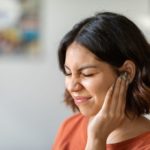As an independent issue, hearing loss can be incredibly debilitating for a person suffering.
A decline in your ability to hear impacts everything in your day to day life – from taking phone calls to watching TV and participating in group conversations. Of course, seeking out professional help and investing in hearing aids can help to improve these effects significantly.
However, hearing loss is far greater than struggling to hear when someone calls your name – in fact, the condition may even lead to a number of associated health problems.
In this article, we will discuss in-depth how hearing loss can increase the chances of developing other medical conditions, and what exactly those are.

Cognitive decline
The connection between hearing loss and cognitive decline has been long established.
Whilst cognitive decline is often attributed to natural signs of ageing, there is evidence to suggest that certain cognitive conditions such as memory loss may actually be caused by hearing loss.
The science behind this makes sense. The inner ear is responsible for processing sounds and transmitting them to the brain, in a way that helps the brain to identify what the sound is and where it’s coming from.
The way that the brain works means that it’s able to filter out sounds that you don’t need to hear and hone in on the ones that it thinks you do. When the brain stops getting the same level and quality of sound, this confuses the process and the brain tries to find the missing sounds. Naturally, this places a great deal of stress on the brain and can result in the onset of cognitive decline.
This connection is particularly prevalent in those who have hearing loss that has been left untreated, as the brain is getting little help in recovering the sounds via treatment methods such as hearing aids.
Studies have also shown that the risk of dementia doubles for those experiencing mild hearing loss. Read our recent article on the connection between hearing loss and dementia where we explore this further.
Vertigo
Hearing loss doesn’t just affect our ability to hear and understand sounds, it can also have an impact on our balance.
Individuals suffering from hearing loss often experience dizziness, trouble with their balance and in some cases, an increase in falls. Some people also report experiencing vertigo, which is a sudden spinning or moving sensation.
A change in our hearing abilities can have a knock-on effect on our balance because our sense of balance is located within the cochlea, deep inside the inner ear where the hearing nerve can also be found.
Vertigo may be experienced by those whose hearing loss developed due to a head or ear injury, where the hearing nerve became damaged. For those who are experiencing sudden hearing loss alongside symptoms of dizziness or a change in balance, this may be a sign of Ménière’s disease.

Tinnitus
Tinnitus can be defined as a constant ringing or buzzing in the ears. In most cases, this is a symptom of sensorineural hearing loss which is caused by damage to the inner ear through overexposure to loud noise or ageing.
These impacts can damage the hair cells in the cochlea and the nerve that is responsible for transmitting information to the brain. As a result, two things can happen: the hair cells can misfire and start to produce spontaneous sounds, and the auditory system can overcompensate by becoming extra sensitive to sounds.
Whilst tinnitus isn’t exclusively caused by hearing loss, it is more common in those suffering from a degree of hearing impairment.
Gut issues
This may be one of the most surprising related problems, but studies have shown that hearing loss can not only affect your cognitive and sensory abilities but also your stomach.
The effects of hearing loss aren’t exclusive to the ears and brain, and can in fact lead to other changes in the body that are associated with muscle tension, stomach upset and anxiety.
For those battling both hearing loss and any of the above, this can further amplify the stress on the stomach and may lead to effects such as abdominal cramps, constipation or diarrhoea.
A 2018 study into the link between changes in the ear and inflammatory bowel disease (IBD) found that sensorineural hearing loss is the most common ear disease in IBD patients. It was included that IBD can be associated with hearing loss and ear disease in all parts of the ear: external, middle and inner.

Mental health problems
Hearing loss can have a tremendous impact on not only your physical health but your mental health too.
For individuals suffering from hearing loss, communicating with others and engaging in social interactions can be incredibly difficult. Particularly for those who don’t wear hearing aids, these struggles are faced on a daily basis and therefore impact all day-to-day activities.
This ongoing frustration can take a toll on an individual’s emotions and wellbeing, and may result in any of the following:
- Fatigue – Hearing loss puts a great deal of strain on an individual due to the energy exerted when trying to hear and process sounds. This strain can be mentally and physically exhausting, resulting in overwhelming feelings of fatigue.
- Anxiety – Having conversations can be nerve-wracking for those hard of hearing, provoking fears that they may not be able to hear what is being said and can trigger stress-induced emotions surrounding having to open up about their hearing difficulties.
- Depression – Noticing a decline in hearing can cause great feelings of sadness as an individual may feel like they’re not the same person as they were before. A 2014 study found that hearing loss is associated with depression, particularly in women and those younger than 70 years old.
- Anger – Hearing loss can be difficult to adjust to, and these feelings of frustration may present themselves in anger and possibly denial, as a person struggles to accept their new situation.
- Loneliness – Hearing loss can lead to social isolation and loneliness, as a sufferer begins to withdraw themselves from social situations to protect themselves from feelings of embarrassment, stress and anxiety.

Can hearing loss be caused by other medical conditions?
Whilst injury and ageing are two of the main causes, hearing impairment can also develop as a result of pre-existing medical conditions.
Heart disease
Hearing loss has been strongly associated with heart disease, or cardiovascular disease (CVD), for many years. The condition occurs when blood vessels narrow or become blocked, and can lead to chest pain, heart attack and stroke.
A 2021 study concluded that adults with moderate to significant hearing loss are five times more likely to have heart disease, with a greater risk of high blood pressure and stroke.
As heart disease occurs as a result of blocked or hardened arteries, this results in impaired blood flow and can damage various organs. The delicate hair cells in the cochlea are responsible for transmitting sound into the ears – without good circulation, these cells are starved of oxygen which can lead to hearing loss.
Diabetes
Studies have shown that hearing loss is twice as common in people who have diabetes. This strong correlation is due to the nerve damage that can happen as a result of diabetes.
Diabetes can cause nerve damage which impacts several parts of the body, including the ears. High blood sugar levels can damage the small blood vessels and nerves in the inner ear, which can lead to hearing loss. Similarly, low blood sugar levels can disrupt how sound signals travel from the inner ear to the brain.
Other conditions that can induce hearing loss include childhood infections such as measles and mumps, sexually transmitted diseases, osteoporosis, multiple sclerosis, and many more.
If you or a loved one may be experiencing hearing loss, it’s important to seek the help of a medical professional.
The Hearing Specialist are fully qualified, registered audiologists serving the communities of Wimbledon, Teddington and Wallington.
Click here to book an appointment at one of our clinics or get in touch with us to find out more.




